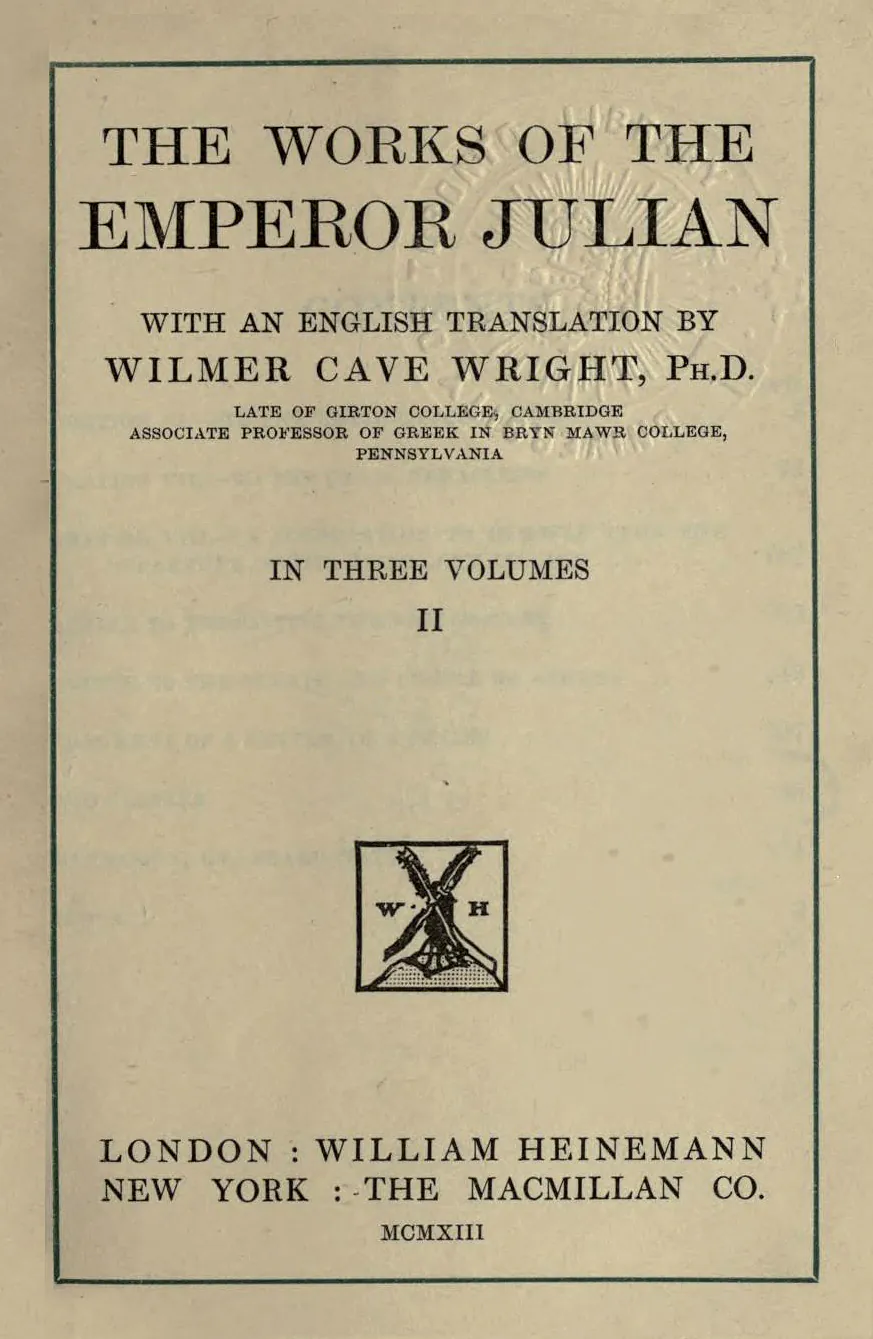[A]
ἀλλ ̓ ὅτι μέλει μοι τῶν τοιούτων ἧττον ἢ τῶν ἐν τοῖς τέλμασι βατράχων. εἶτα οὐκ εἰκότως ἐμαυτοῦ κατηγορῶ τοσαύτας ἀπεχθείας λαβὰς παρασχόντος;
Ἀλλ ̓ ὁ Ῥωμαῖος Κάτων, ὅπως μὲν ἔχων πώγωνος οὐκ οἶδα, παρ ̓ ὁντινοῦν δὲ τῶν ἐπὶ σωφροσύνῃ καὶ μεγαλοψυχίᾳ καὶ τὸ μέγιστον ἀνδρείᾳ μέγα φρονούντων ἄξιος ἐπαινεῖσθαι, προσιὼν τῇδε τῇ πολυανθρώπῳ καὶ τρυφερᾷ καὶ πλουσίᾳ πόλει
[B]
τοὺς ἐφήβους ἰδὼν ἐν τῷ προαστείῳ μετὰ τῶν ἀρχόντων ἐσταλμένους ὡς ἐπί τινα δορυφορίαν ἐνόμισεν αὑτοῦ χάριν ὑμῶν τοὺς προγόνους τὴν παρασκευὴν πᾶσαν πεποιῆσθαι· καὶ θᾶσσον ἀποβὰς τοῦ ἵππου προῆγεν ἅμα καὶ πρὸς τοὺς προλαβόντας τῶν φίλων δυσχεραίνων ὡς μηνυτὰς γενομένους αὐτοῖς, ὅτι Κάτων προσάγει, καὶ ἀναπείσαντας ἐκδραμεῖν. ὄντος δ ̓ ἐν τοιούτοις αὐτοῦ καὶ διαποροῦντος ἠρέμα καὶ ἐρυθριῶντος, ὁ γυμνασίαρχος προσδραμών, Ὦ ξένε, ἔφη,
[C]
ποῦ Δημήτριος; ἦν δ ̓ οὗτος ἀπελεύθερος Πομπηίου, κεκτημένος οὐσίαν πολλὴν πάνυ· μέτρον δ ̓ αὐτῆς εἰ ποθεῖτε μαθεῖν· οἶμαι γὰρ ὑμᾶς ἐκ πάντων τῶν λεγομένων πρὸς ταύτην μάλιστα ὡρμῆσθαι τὴν ἀκοήν· ἐγὼ τὸν εἰπόντα φράσω. Δαμοφίλῳ τῷ Βιθυνῷ πεποίηται συγγράμματα τοιαῦτα, ἐν οἷς δρεπόμενος ἐκ βίβλων πολλῶν1ἐκ βίβλων πολλῶν Hertlein suggests, ἐκ τῶν πολλῶν MSS. εἰργάσατο
[D]
λόγους ἡδίστους νέῳ φιληκόῳ καὶ πρεσβυτέρῳ· φιλεῖ γὰρ τὸ γῆρας ἐπανάγειν αὖθις εἰς τὴν τῶν νέων φιληκοΐαν τοὺς ἀφηλικεστέρους· ὅθεν οἶμαι συμβαίνει νέους καὶ πρεσβύτας ἐξ ἴσης εἶναι φιλομύθους· εἶεν.
ὁ δὲ δὴ Κάτων ὅπως ἀπήντησε τῷ γυμνασιάρχῳ βούλεσθε φράσω; μή με λοιδορεῖν ὑπολάβητε τὴν πόλιν· οὐκ ἔστιν ὁ λόγος ἐμός. εἴ τις ἀφῖκται
[A]
but because I care less for things of that sort than for frogs croaking in a pond.2A proverb to express complete indifference. Then is it not natural for me to accuse myself, when I have furnished so many handles for your hatred?
Cato the Roman,3The anecdote which follows is told by Plutarch in his Cato the Younger and also in his Pompeius. however, – how he wore his beard I do not know,4Julian must have known that in Cato’s day the Romans never wore beards. but he deserves to be praised in comparison with anyone of those who pride themselves on their temperance and nobility of soul and on their courage above all, – he, I say, once visited this populous and luxurious and wealthy city;
[B]
and when he saw the youths in the suburb drawn up in full array, and with them the magistrates, as though for some military display, he thought your ancestors had made all those preparations in his honour. So he quickly dismounted from his horse and came forward, though at the same time he was vexed with those of his friends who had preceded him for having informed the citizens that Cato was approaching, and so induced them to hasten forth. And while he was in this position, and was slightly embarrassed and blushing, the master of the gymnasium ran to meet him and called out, “Stranger, where is Demetrius?”
[C]
Now this Demetrius was a freedman of Pompeius, who had acquired a very large fortune; and if you want to know the amount of it, – for I suppose that in all that I am now telling you are most anxious to hear this, – I will tell you who has related the story. Damophilus of Bithynia has written compositions of this sort, and in them, by culling anecdotes from many books,
[D]
he has produced tales that give the greatest delight to anyone who loves to listen to gossip, whether he be young or old. For old age usually revives in the elderly that love of gossip which is natural to the young; and this is, I think, the reason why both the old and the young are equally fond of stories.
Well, then, to return to Cato. Do you want me to tell you how he greeted the master of the gymnasium? Do not imagine that I am slandering your city; for the story is not my own.5cf. Fragment of a Letter 299 C, note.
EN translation: Wilmer Cave Wright, 1913
LEARN MORE
Place your mouse over a term to see corresponding popup from Wikipedia.
ALL PAGES

| Title | London: The Works of the Emperor Julian, Volume II/III |
| Publisher | London: William Heinemann |
| Year | 1913-23 |
| Pages | 416-511 pp. [vol. II: 538 pp.] |
| Translation | Wilmer Cave Wright. PhD |
| Editors | T.E. Page and W.H.D. Rouse |


